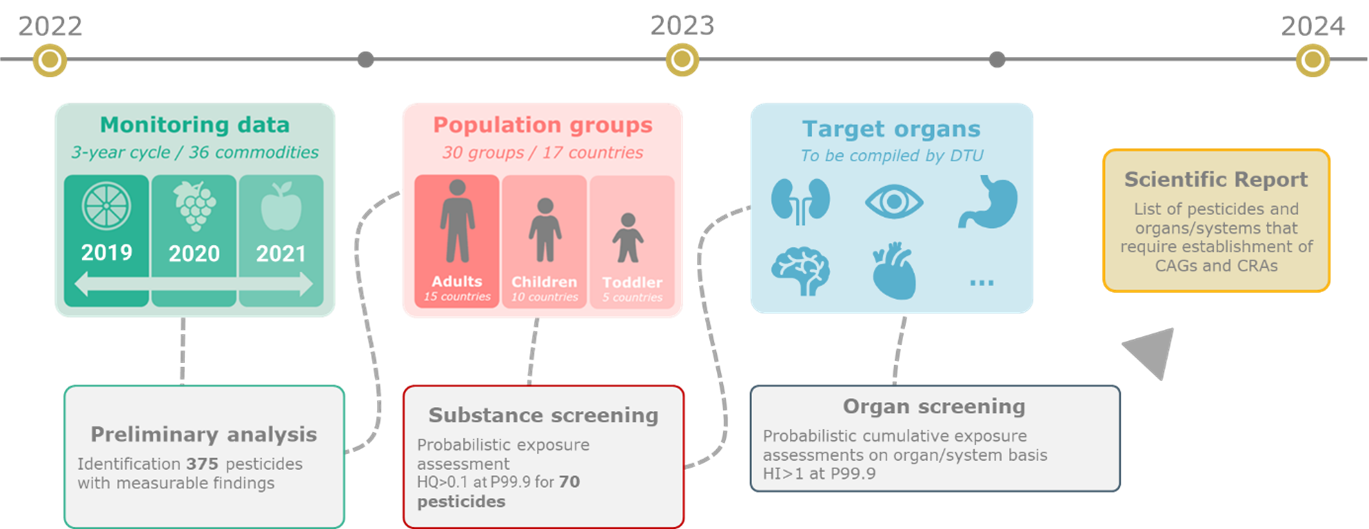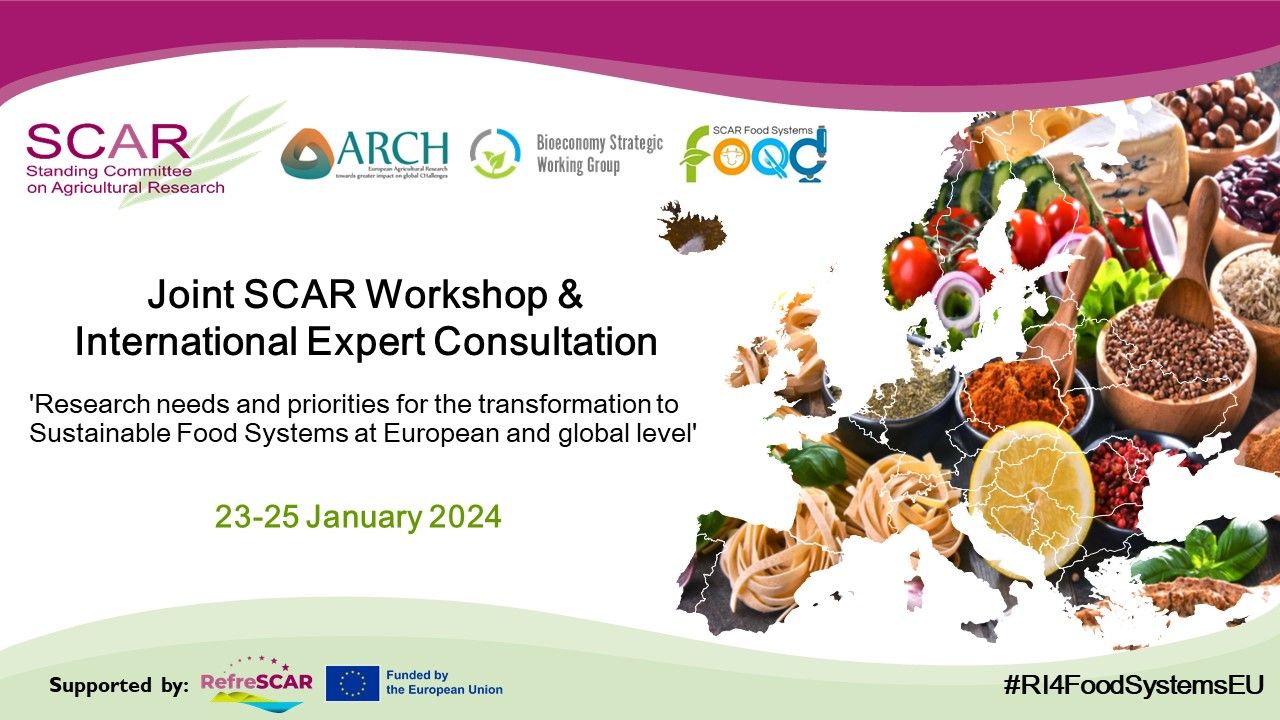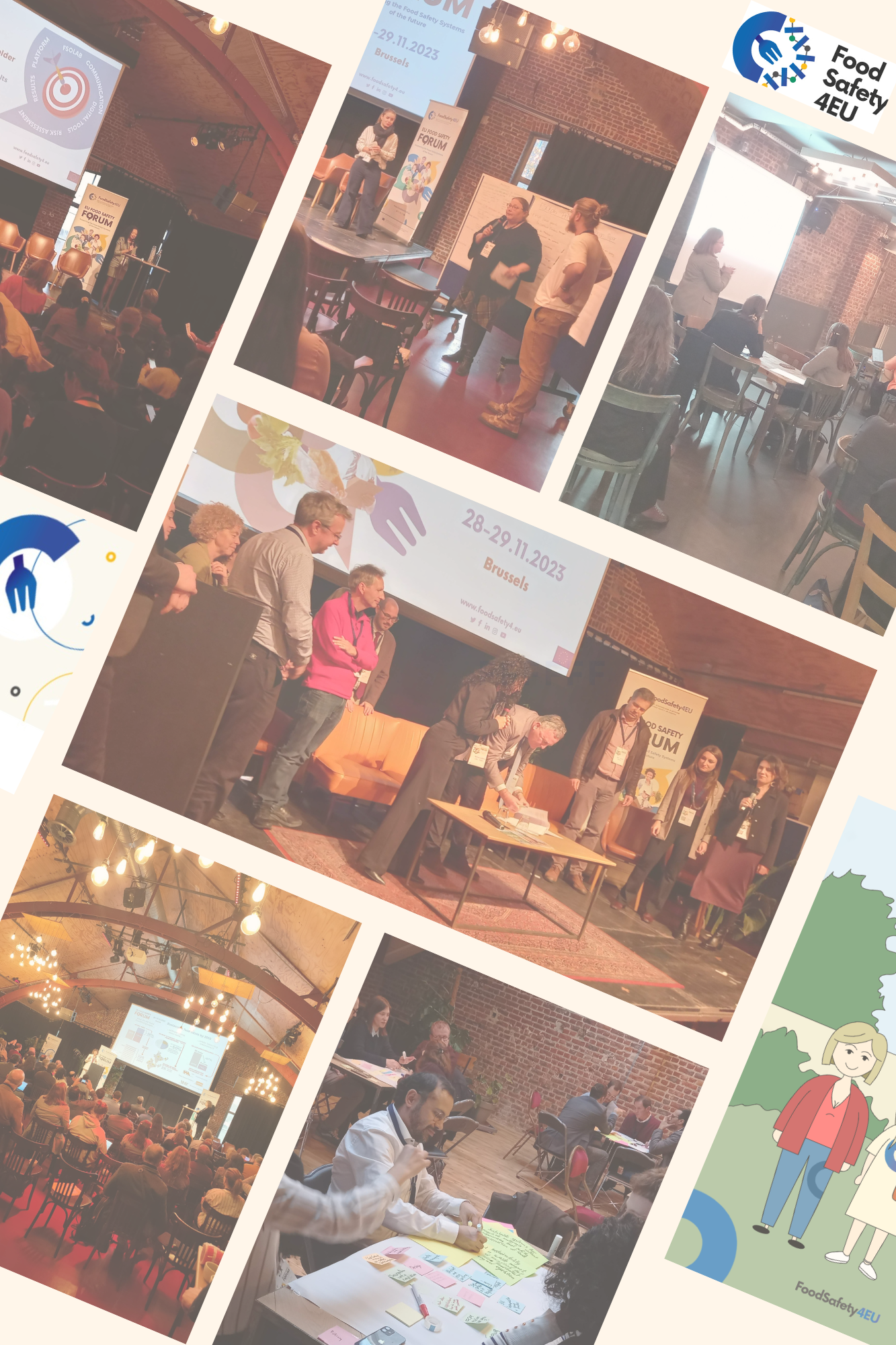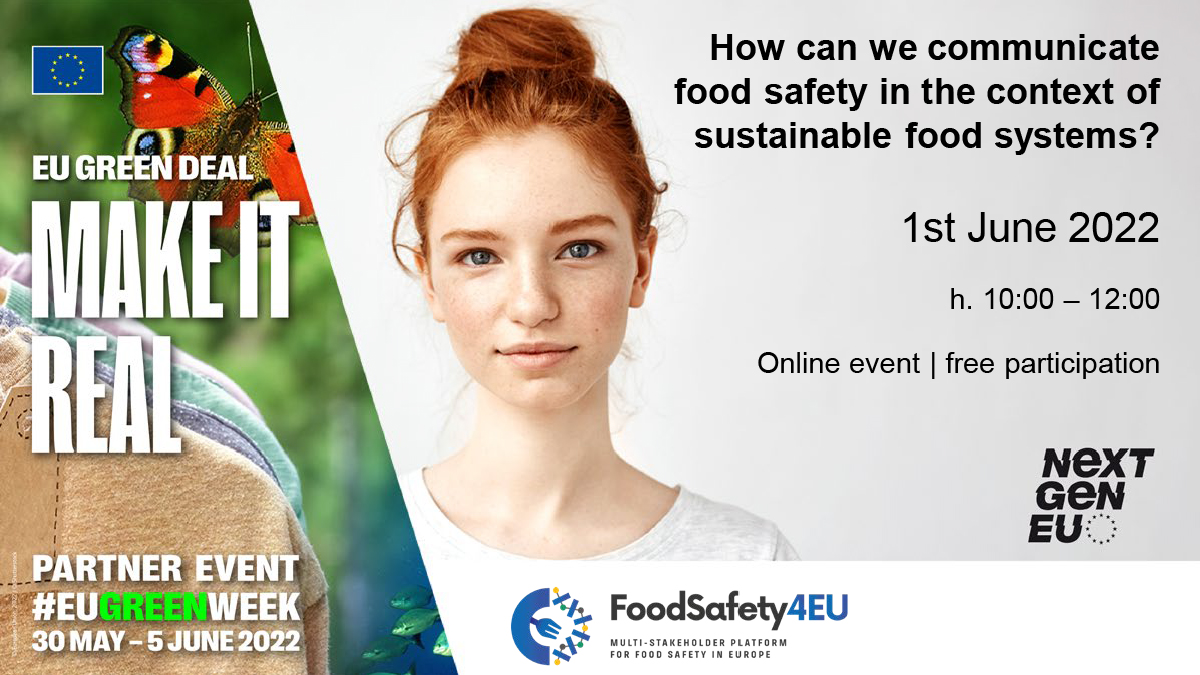FoodSafety4EU PRE-FORUM 2022 – “The new sustainability regulation: how to integrate it into food safety?”

Download PDF: https://doi.org/10.5281/zenodo.7621172
The 2022 Pre-Forum was organised in Brussels on 15 December, drawing the participation of representatives of project partners and external stakeholders of various types (NGOs, research and academia, agencies).[1]
BACKGROUND
Safe, authentic and nutritious food is key to sustaining life and promoting good health, yet the current EU food safety system falters when a need arises to quickly adapt to a continuously evolving food chain. The EU-funded FoodSafety4EU (FS4EU) project kicked off in January 2021 as a step forward towards a more engaged and co-operative Food Safety System (FSS) in Europe. The project aims to design, develop and release a multi-stakeholder platform, along with new digital tools to help citizens, scientists, companies, European Commission (EC), European Food Safety Authority (EFSA), and national Food Safety Authorities co-design Europe’s future food safety system.
With the overall ambition of becoming a Competence Centre for Food Safety in Europe supporting the transformation towards a safe and sustainable food system, the FS4EU platform is shaped to:
- Reduce the current fragmentation of the EU FSS, facilitating higher value interactions between its actors in the multi-levelled system.
- Support EC and EFSA to address the main food safety challenges and formulate appropriate recommendations.
- Make available selected knowledge and data (by delivering digital solutions) enhancing the public confidence.
INTRODUCTION
The meeting was opened and co-chaired by Nunzia Cito – National Research Council of Italy – Institute of Sciences of Food Production (CNR – ISPA) and Agency for the Promotion of the European Research (APRE), FS4EU Coordination Team and Nastasia Belc – National Research and Development Institute for Food Bioresources (IBA Bucharest), FS4EU and SCAR WG member. The first and second sessions were moderated by Todor Ivanov – Secretary-General of Euro Coop, who also served as event rapporteur, whilst the third session by Matteo Sabini – Collaborative Projects Lead, European Food Information Council (EUFIC).[2]
The co-chairs briefly presented the project objectives by explaining that, funded by a H2020 policy driven call, FS4EU is expected to provide input for the future Food Safety R&I framework and policies, supporting EC and EFSA in establishing the fundamentals of a new FSS. Hence, the project aims to deliver solutions for the alignment of research, policy and innovation, on one hand, with the societal needs and perspectives on the other, whilst ultimately improving food safety across Europe.
Qualified and diverse input is ensured through the project’s consortium composed of 23 partners across 12 EU Member States and Associated countries, engaging with a network of over 50 supporting partners , representing a cross section of research institutions and academia, food busines operators, food safety authorities, ministries, consumer associations and umbrella networks. The input shall relate to proposing new standards procedures, updating research agendas at national level and generating new knowledge for further implementation in new projects and initiatives.
Stemming from this, the co-chairs explained that the purpose of this meeting was to bring together, for the first time in-person, various stakeholders of the food system and their position on the subject of integrating the upcoming sustainability policy framework within the principle of food safety. For the purposes, all speakers were requested to shape their interventions by identifying 1-2 key challenges and opportunities for reconciling food sustainability and food security. Through the discussions, the event also aimed at exploring themes of interest to be featured in the 2023 Forum – which would be the project’s last annual event.
PANEL 1 – Voices from the FoodSafety4EU Platform
PRESENTATIONS
Fabrizio Fabbri – Food & Sustainability Policy Manager,
Title: “What are the key issue to guarantee food sustainability for consumers?”
It is important to note that whilst there is not yet a universal definition of a sustainable food system, it is widely recognised that the current food system is unsustainable, which requires attention to its social, economic and environmental components. The social aspects entail guaranteeing worker rights along the entire chain. Economic aspects include: fair remuneration for primary food producers, fair market price for consumers (directly relating to food security), paying the true price for food (internalising the current externalities), and reinforcing the capacity of small and medium enterprises’ (SME) businesses in adapting to the new legislation. Environmental aspects include: greenhouse gas (GHG) emission reduction along the entire chain, food waste / loss reduction (last available data: 127 kg. food waste / capita), proper water and land use, reduction of external chemical inputs, preservation and restoration of habitats and biodiversity and reducing packaging and packaging waste.
All these aspects are important because consumers are also citizens, and as such, they have the right to: live in a healthy environment, work under safe and fair conditions, receive a fair salary, get access to affordable, healthy and safe food, and be properly informed about the sustainability of the food production system. Conversely, citizens, as consumers, also have duties: to reduce the amount of food wasted on household level (46% of total, representing 8-10% of the total GHG emission at EU level); to reduce the dairy and meat intake (beef and dairy industry account for 77% of livestock emissions), to increase vegetable protein intake; to buy organic and locally grown food, and to reduce the amount of packaging and to increase recycling. Based on this, an adequate legal framework for a sustainable food system should tackle the following overarching issues: fight food (price) speculation, modulate incentives for bioenergy to support food waste reduction and hierarchy (ie food redistribution/processing/animal feed/energy), internalise the negative externalities of food price (environmental and social aspects), and ensure a level playing field among business models for food operators (ex. community based, co-op model).
Jonas Lazaro Mojica – Senior Manager, EU Projects and ETP Food for Life Secretariat, FoodDrinkEurope
Title: “What are the key issues to guarantee food safety for the industry?
The strategy of the food and drink industry to transition to sustainable food systems consists of concrete actions in three areas: climate change (net zero emissions by 2050, halve food waste by 2030, deforestation-free food chain, sustainable farming), sustainable packaging (all food produced and packaged to be reusable and recyclable by 2023) and nutrition (healthier diets for all European citizens by way of more informed choices). Of particular interest are the EU regulations on food contaminants in three areas: agricultural contaminants – mycotoxins, plant toxins and plant protein products; environmental contaminants – POP (persistent organic pollutants), MOH (mineral oil hydrocarbons), endocrine disruptors, heavy metals, microplastics; industrial contaminants – acrylamide, 3-MCPD (monochloropropanediol) esters & GE (glycidyl esters), furan, PAH (polycyclic aromatic hydrocarbons).
The Rapid Alert System for Food and Feed (RASFF) provides the latest information on food recall notices, being an important resource that allows easy transfer of information across the borders. In 2021, 4607 notifications were transmitted via the System, 84% of which related to food: pesticides (27%) pathogenic microorganisms, such as Salmonella and listeria monocytogenes and Ethylene Oxide (19%), and mycotoxins. The other most common food hazard reported in 2021 were allergens. The 2023 EU regulatory and policy outlook for contaminants was also presented as a timeline between Q4 2022 and Q4 2023.
Regulatory developments on the Chemicals Strategy for Sustainability include the introduction of the Generic Risk Approach, Essential Use concept in REACH and introduction of new hazard classes in the CPL regulation. The cross-over of regulations is quite complex.
The following regulatory challenges were identified: excessive application of the precautionary principle; intensification of a hazard-based approach in the EU regulatory framework; the proliferation of national rules on food safety, leading to a patchwork; the existence of double regulation for certain chemicals (‘One substance One assessment’); and the decrease of impact assessments, which is detrimental to the overall system. EU’s food safety is a shared responsibility, but it needs a logical and reasonable division.
Hanna Schebesta – Associate Professor,
Department of Social Sciences, Law Group, Wageningen University (WUR)
Title: “How will the new regulatory framework drive future research?”
The framework law on sustainable food systems is welcome because in the current EU policy architecture there is a sustainability blind spot (e.g. the General Food Law deals with food safety, but not food sustainability). The conceptualisation of sustainability is correct by shifting the vocabulary from supply chains to food systems and in defining food as a common good, prompting government and authorities to act as a societal issue.
However, very little is known about the general aspects, such as the definitions, principles, objectives, requirements, minimum standards, responsibilities or how the horizontal elements for sustainability analysis complementing existing risk analysis. Unknown is also how the legislation will relate to certain specific aspects: imports, public procurement, sustainability labelling, governance mechanisms. The undertaken impact assessment shows that a lex generalis approach with integrated lex specialis is envisaged, with a legal obligation for progressive adaptation over time and a combination of push and pull provisions.
Several objectives were identified for the successful establishment of sustainable food systems. Firstly, the timeframe must develop a 2-stage approach with longer implementation window. For example, the first step could be the Farm to Fork Strategy and the second step to include a long-term alignment with the CAP (the EU’s common agricultural policy) and integration with the General Food Law to ensure adherence to food safety and sustainability. Secondly, the metrification of sustainability should be the basis for any legal objectives, policy measures and actions. This would also require legal conceptualisation on how to operationalise sustainability. Thirdly, actions beyond the Farm to Fork Strategy, such as EU Treaty changes (e.g. give EU health competences), integration of agri-food policy, institutional changes in the food architecture (e.g. broaden the EFSA mandate beyond solely food safety), moving away from the sectoral (silo) approach to food and establishing the one health approach.
Axel Mauroy – Staff Direction for Risk Assessment, Control Policy,
Belgian Federal Agency for the Safety of the Food Chain (FASFC- FAVV – AFSCA)
Title: “What are the key challenges to guarantee food safety for the Food Safety Authorities?”
Beyond reglementary analyses and controls, Food safety authorities (FSA) must control the adherence to food safety along the supply chain by a classical three-steps operation: risk perception, risk assessment and risk management. Furthermore, new regulations in food safety are more and more encouraging strategies based on risk analysis, an entire process covering risk assessment, management and communication. There is complexity due to the various definitions and their ensuing protocols for food safety, food security and food sustainability, further impaired by the current concept of healthy food (for which FSA are usually less competent). The globalisation of the market and supply chains requires more control, regulation, standards, (rapid) data sharing to prevent foodborne outbreaks, as well as co-operation between Member States, i.a. under the EFSA umbrella. The role of science is of utmost importance to support the mission of FSA. This includes research, new assessment procedures feeding a so-called ‘regulatory science’ (allocate a sufficient part of the European research to provide relevant data and information aiming at guidance of FSA activities – about this concept, see also: H. Deluyker, 2017. Is scientific assessment a scientific discipline? EFSA Journal 2017;15(11):e15111, 51 pp). Data should be regarded as one key aspect in all FSA operations and many challenges yet remain associated with their access, exchange, inter-operability and use.
FSA operational challenges include a well-structured and coherent procedure for risk assessments on the field, fight against fraud, data accessibility, transparency, risk perception from both consumer- and producer-sides and accurate and timely risk communication. Technological challenges once again include fraud but also regular update in analytic capacities. Strategic challenges are funding, innovation, standardisation in regulations, norms and actions between Member States and continuing education/training of FSA staffs.
Beyond the classical challenges of food safety that are facing all the actors of the food chain, a global population of 10 billion people will be supported as early from 2050, which will require getting the right trade-offs between sustainability (including make better use of the food already produced and reduce food waste), food security and food safety. Furthermore, these aspects must not be considered apart from food sovereignty and food equity. The next decades should be dedicated to this overarching challenges by all players in the food chain, including FSA.
DISCUSSION
In the ensuing discussions, the moderator asked all speakers to identify the leading challenges facing food safety within the overall transition to food sustainability. These could be grouped in order to priority: 1. metrification (of sustainability performance), 2. funding (financial instruments), 3. legal operationalisation, and 4. organisational capacity (at EU and MS level).
PANEL 2 – Discussing priorities with value chain stakeholders
PRESENTATIONS
Bruno Menne – Senior Policy Advisor,
European Farmers European Agri-Cooperatives (Copa-Cogeca)
Title: “What are the key challenges to guarantee food safety for the agricultural sector?”
There is a risk that food sustainability creates dilemmas in reconciling with food safety and how to mitigate the ensuing risks. For example, whilst food safety is a pre-requisite, the Packaging and Packaging Waste Directive calls for decreasing packaging for fruits and vegetables, but this same packaging also guarantees safety. The solution between these types of dilemmas is finding the right balance, such as keeping the risk-based approach, and not the hazard-based.
If the framework law for sustainable food systems (SFS) is not carefully designed, it will impact food security and food affordability, and therefore food safety. New sustainability requirements are possible but if overly ambitious and lacking adequate support mechanisms, they will decrease yields and increase costs of production. Hence the question of who would pay for this – consumers / the market or producers. Logically, if the market (consumers) does not pay for it and the producers are unable to pay for it (for lack of adequate income/capacity), there must be a dedicated budget for SFS framework objectives.
In conclusion, higher sustainability is possible, but it is a society choice. If this transition is not managed strategically, farmers will go out of business and those who survive will concentrate the market share, externalisation of production to third countries, sustainability leakage, risk for food safety, because operators might be tempted to cut costs.
Antoine D’haese – Sustainability Policy Manager,
Safe Food Advocacy Europe (SAFE)
Title: “What are the key challenges to guarantee food safety for the civil society?”
Fragile food systems are facing many challenges of various types. Health challenges such as food safety and health concerns and health crises. Inclusion challenges such as access to healthy food and food security at large. Environmental challenges such as deforestation, biodiversity loss, soil depletion and climate crises. Any solution to these challenges must include diversification of diets and building food systems resilience.
The new proposal for a SFS framework law is expected for end 2023 and it should ensure policy coherence (General Food Law, SFS, CAP, Fisheries, CEAP – circular economy action plan, etc.), adopt a food environments approach (focusing away from solely consumer responsibility of choice, addressing policies for food pricing, promotion, marketing, composition labelling, retail environments) and set time and legally binding targets for GHG emissions, food waste reduction, adoption of healthy diets and in line with the Sustainable Development Goals (SDGs), as well as identify and apply strong accountability/performance mechanisms to monitor progress (metrification and national reports).
The reality of the problem is that globally, 38% of edible parts of food produced for human consumption is lost/wasted (1.3 billion tonnes of FLW (Food Loss and Waste)/year). In the EU, 89 million tonnes of FLW/year is generated, accounting for 20% of the total food produced and valued at € 143 billion. This FLW amounts to 8-10% of the global GHG emissions.
This could be reversed only if a comprehensive multi-stakeholder approach is implemented with ambitious targets, coherent implementation and rigid reporting/control. The answer to the question who pays for it should be that everyone pays for it.
Angela Frigo – Secretary General,
European Food Banks Federation (FEBA)
Title: “What are the key challenges to guarantee food safety for the European food banks? – Food donation: ensuring food safety to contribute to food security”
36.2 million EU citizens cannot afford a quality meal (meat, fish or vegetarian equivalent) every 2nd day. Food banks belonging to the European Food Banks Federation (FEBA) reduce food insecurity and prevent food waste. Certain edible and safe food which is not fit to be sold to consumers can be recovered and redistributed by food banks, such: 1. Agricultural produce not in line with market standards or withdrawn from the market to stabilise prices; 2. fish caught illegally; 3. Food/drinks with targeted packaging after the respective campaign is over or leftover once a producer changes the recipe of a given product; 4. Supermarket goods before the expiration date; or 5. Prepared meals from cruise ships, airlines, and the food service sector.
The COVID pandemic has resulted in an 18% increase in the demand of food from the charities assisted by FEBA members. This means more and more people are in need, especially after the 2022 war in Ukraine, inflation and rising food prices. In Belgium in 2022 alone the increase was 15%.
Member States are urged to uptake the EU guidelines on food donation established by the EU Platform on Food Losses and Food Waste. Positive amendments by the EU Commission to facilitate food donation include Regulation (EC) No 852/2004 (donating food after best before date indicating quality, not safety) and Regulation (EC) No 853/2004 – food of animal origin (allowing the retailer to freeze at the item before expiry and donating it). Ensuring food safety while fostering food donation is a priority for FEBA members: for instance, in Italy Banco Alimentare together with Caritas Italiana and with the validation of the Ministry for Health drafted a manual with hygiene practices to recover, collect, store, and redistribute food for charitable purposes while assuring food safety.
DISCUSSION
As with Panel 1, all speakers identified their leading challenges facing food safety within the overall transition to food sustainability. These could be grouped in order to priority:
1. Funding – financial instruments, 2. Strategic implementation – longer timeframe and ambitious targets, and 3. Food environment aspects – access to food.
PANEL 3 – Projects from the EU Food Safety System
Stakeholders active in EU projects and other research initiatives within the Food Safety System presented their activities, which could be of interest to and in correlation with the objectives of FS4EU.
Project SAFECONSUME: Solveig Langsrud – Project Coordinator, Nofima
The overall objective is to reduce the health burden from foodborne illnesses, 40% of which occur at household level. Scientifically basedtools and products, games, communication strategies, educational materials and policy recommendations were developed aiming to change consumer behaviour to reduce their exposure to hazads.
Key message to policy brief: From what we know about consumers, an obvious challenge during a green transition will be to maintain food safety. Food prices will increase (leading to increased consumption of unsafe food), and safe technologies will be replaced by unsafe (e.g less protective plastic packaging). Several measures will be necessary to counteract an increase in foodborne illness, and it is important to build policy on trans-disciplinary science.
Project “HUMYCO”: Marthe De Boevre – ERC Grant PI, Ghent University
The objective of this University of Ghent project is to investigate human mycotoxin exposure through uniting large scale epidemiological and mechanistic polynomic designs. This requires identifying new mycotoxin biomarkers, linking them to an open-access database, running them through external risk assessment and internal risk assessment processes. The current challenges include scattered and poorly designed safety data, missing links between human exposure and disease outcomes, and the fact that biomarker analysis is still a developing field.
Project “One Health EJP TOXOSOURCES”: Pikka Jokelainen – Project Coordinator, Statens Serum Institut
This EU-funded project investigates the relative importance of transmission pathways of the zoonotic parasite Toxoplasma gondii via the environment (oocyst-borne) or via meat (tissue-cyst-borne). This requires advancing science (improving the understanding regarding epidemiology), establishing new methods (harmonized approaches, better preparedness) and utilizing a multidisciplinary and cross-sectoral collaboration.
Key message to policy brief: The experiences from applying a One Health approach to address a complex food safety issue are encouraging. Multidisciplinary, cross-sectoral collaborations are needed.
Project “TITAN”: Isabelle Guelinckx – Project Coordinator ILSI EU
The objective is to develop demand-driven and cost-effective innovations that enhance food transparency and facilitate improvements in food safety, sustainability and health, including consumer decision-making. This means increasing the access to relevant data, reducing food safety issues, higher income for vulnerable workers, improved nutritional intake by vulnerable children, reducing valuable resources like water in food production, more economic value for carbon storage, reducing food losses and waste and food fraud cases, as well as increasing trust between food operators. Support measures must include a policy roadmap that highlights opportunities and challenges associated with integrating transparency solutions in future policies on transforming food systems, as well as an inventory of state-of-art technologies. Overall, consensus is mandatory among food system operators on how to communicate relevant information about food safety, nutrition, and all three dimensions of sustainability to citizens. Incentives to stimulate behaviour changes are also needed.
Project “HOLIFOOD”: Maria Scherbov – Project partner, EUFIC
The aim is to improve the integrated food safety risk analysis framework in Europe so that it meets future challenges of the Green Deal, whilst contributing to the UN SDGs and supporting the realization of a secure and sustainable food production. This calls for designing a new and improved analysis framework focusing on maize, lentils and chicken, whilst using AI and Big Data to develop an early warning risks prediction system for food safety hazards. This calls for a holistic risk assessment for regulation and data and knowledge for sharing infrastructures. Other priorities include: scalable ERI systems to other food supply chains, innovative detection and monitoring methods for emerging risks, increased administrative expertise and capacity and improved regulatory science.
Project “FoodPathS”: Hugo de Vries – Project Coordinator, INRAE (video)
The objective is to design a prototype SFS partnership that inspires, is inclusive in its governance, and is exemplary in its systemic way of working. This shall be achieved by: food systems approaches, co-funding strategies, exchange of experience and best practices, academic support (university network), exploitable SRIA for R&I, science-policy and education correlation, verified potential trade-offs and co-benefits, a set of interactive communication tools and a new modus operandi for the entire system. It is of utmost importance to understand the consequences of key principle of SFS for the food safety, like diversity (resources, actors), circularity (potential accumulation, market concentration, operator responsibilities), robustness, functionalities, food system scaling, and resilience (butterfly effect). All these in the context of the three dimensions of sustainability.
CASE STUDY
Celine Meerpoel – Postdoctoral Researcher and EU-FORA 2022/2023 fellow from the Ghent University presented the work of a group of students – future risk assessors and communicators, who are involved in a co-creation workshop on how to improve food risk communication and engage wider public, taking the example of the salmonella in chocolate crisis.
The workshop featured four parts, as follows: 1. Presentation of experts in the field (from the Belgian Food Safety Authority, journalists, experts in crisis communication and reputation); 2. Creative group brainstorming to develop a communications strategy; 3. Pitching the ideas among the groups; and 4. Collectively selecting the best communication strategy.
Outputs of the workshop include students learning about the basic principles of food safety crisis communication, allowing them to raise some important points on how this could be improved: a) the need of well-designed social media campaigns to inform the public, b) food producing companies must be obliged to invest in their own communications and maintain direct contact with the food safety authorities, and c) rapid sharing of verified information. Overall, the process facilitates the establishment / improvement of an interactive model to further engage the wider public about food safety and especially in food safety crises (e.g. salmonella in chocolate).
CONCLUSIONS and PERSPECTIVES
The co-chairs Nunzia Cito and Nastasia Belc invited all participants to briefly discuss about the priorities and structure of the project’s (final) Forum in 2023. The questions addressed were
1. How to bring the input of today to the Forum (e.g. working group, discussion, break-out session, poster, publication) and 2. Which priority themes should be addressed. Key points are displayed in Graph 1. In conclusions, the listed priorities / challenges identified each session are as follows:
Session 1:
- Metrification of sustainability;
- Sustainability is complex – it is a multifactor issue;
- Legal operationalisation
- Organisational capacity
- Funding (to facilitate operators and authorities’ capacity);
Session 2:
- Funding (to facilitate operators and authorities’ capacity);
- Strategic implementation – longer timeframe and ambitious targets;
- Food environment aspects – access to food.
Session 3:
- The food safety system has a huge potential and capacity owing to the complex network of stakeholders who are active in various fields – multidisciplinary collaborations are needed;
- Combining research and communication innovation has the potential to change consumer habits and inform the wider public about food safety issues;
- Systemic approach in the food safety system is essential and funding is critical;
The co-chairs and the moderator thanked all participants and speakers for the insightful presentations and informed discussions. It was reminded that additional working meetings will be scheduled in preparation for the 2023 European Food Safety Forum, also scheduled to be held in Brussels.
Pre-Forum speakers’ ideas and hopes for the future Food Safety System:
Summary
| Research and Innovation Perspectives |
| FoodPath: Knowledge creation |
| Understand what are the consequences of key principles of Sustainable Food System for the Food Safety Area: 1. Diversity – in resources, actors, contexts; 2. Circularity – potential accumulation, changed responsibilities,..; 3. Robustness – (new) functionalities; 4. Scales and scaling of Food Systems; 5. Butterfly effects (resilience); 6. Targeting the 3 dimensions of sustainability: social, environment and economic |
| HOLiFOOD: Integration of the food safety Risk Analysis framework |
| 1. Integrated EU data and knowledge exchange platforms; 2. Long-term anticipation and prevention of food safety issues; 3. Holistic risk assessment; 4. New and innovative early (un) targeted detection and monitoring methods for emerging risks; Improved regulation and regulatory science. |
| One Health EJP Toxosources: Food safety, zoonoses, One Health |
| 1. Advancing science; 2. Improved understanding regarding epidemiology and molecular epidemiology; 3. Quantitative estimates of main sources and transmission pathways; 4. New methods: harmonization; 5. Better preparedness to detect and investigate outbreaks and emerging strains; 6. Multidisciplinary, cross-sectoral collaborations. |
| Sustainable Food System Partnership: Legislative framework |
| Framework legislation sustainability: 1. Sustainability principles and objectives; 2. General minimum standards; 3. Defining responsibilities of food system actors; 4. Horizontal elements for sustainability analysis complementing the existing ‘risk analysis’ principle. Integration of legislation – vocabulary, relationships, transfer the interest from individual to public. Sustainability metrics: sustainable change – treaty changes, institutional changes. |
| HuMyco: Prevention exposure to contaminants |
| Challenges: – Scattered and poorly described data; – Needs on data at European level. |
| Education perspective |
| UGENT: Food safety crisis communication |
| 1. Dedicated on-site workshops as an effective tool to engage students in food safety communication; 2. The workshops as a good model to stimulate interaction between experts and the students, to co-create solutions; 3. Needs on well-designed social media campaigns for public information; 4. Internal and external effective communication (direct contact with National Food Safety Authority) of Food Business Operators; 5. Rapid sharing of verified information as an important factor in effectively crisis managing. |
| Industry perspective |
| FoodDrinkEurope: Technology |
| Regulatory needs – policy coherence: 1. Contaminants (agriculture, environment, industry); 2. Ingredients and additives. |
| Agriculture perspective |
| Copa-Cogeca: A society choice 1. Mitigate risks; 2. Food safety vs.sustainability; 3. Packaging; 4. Risk-based approach for finding a right balance; 5. Costs of sustainability. |
| Consumers perspectives |
| TITAN: Transparency solutions for transforming the food system |
| 1. Consensus among Food system actors – relevant communication about food safety, nutrition & sustainability to citizens; 2. How to provide incentives to stimulate behaviour change? Especially PUBLIC PROCUREMENT. |
| SAFE – Safe Food Advocacy EU: Systemic transformation – legal framework |
| Health, inclusive, environment. Set time – and legally – binding targets in line with SDGs: 1. Food Waste reduction; 2. GHG emissions; 3. Healthy diets; 4. Identify&apply strong accountability /performance mechanisms to monitor the progress; 5. Indicators to monitor progress and timely achievement of objectives: on food sustainability at national level; Reducing Food Losses and Waste – identify the best logistic and management. |
| Eurocoop: Social |
| 1. Dietary shift; 2. Reducing food waste; 3. Promoting sustainable production and packaging; 4. Market: supporting cooperative business model along the chain to reduce the costs, increase transparency and accountability. |
| EU Food Banks Federation: Social |
| 1. Food donation: ensuring food safety to contribute to food security; 2. Manual/guidance of hygienic practices. |
| SafeConsume: Social (behaviour) 1. Labelling (smart, new criteria including handling); 2. Packaging (new criteria, including sustainability standards). |
| Food Safety Authority perspectives |
| Federal Agency for the Safety of the Food Chain: Operational challenge |
| 1. Risk assessment and science-based policies; 2. Fraud: accessibility and transparency for the consumer; 3. Improve Communication: Risk communication vs risk perception (crisis). 4. Technological changes; 5. Strategic challenges: Globalization; 6. Funding (financial support); 7. Innovation and standardization in risk assessment; 8. Education, training, skills and experience of Human Resources; 9. Strengthening participation in R&I; 10. Collaboration between Member states; 11. Crisis preparedness. – efficacy of data uses. |
[1] See Annex A for full agenda.
[2] See Annex B for the full list of participants.
Latest Articles

Towards holistic, AI-driven emerging risk assessment: catching stakeholders’ needs in Living Labs

Protecting public health: understanding the importance of cumulative risk assessment of pesticides

SCAR consultation workshop on Sustainable Food Systems: highlights from EU FOOD SAFETY PLATFORM

Pioneering advances in the EU Food Safety System: highlights from the first EU Food Safety Forum
Food4Future_cz

New Tools for Preventing Harmful Bacteria in Ready-to-Eat Foods



